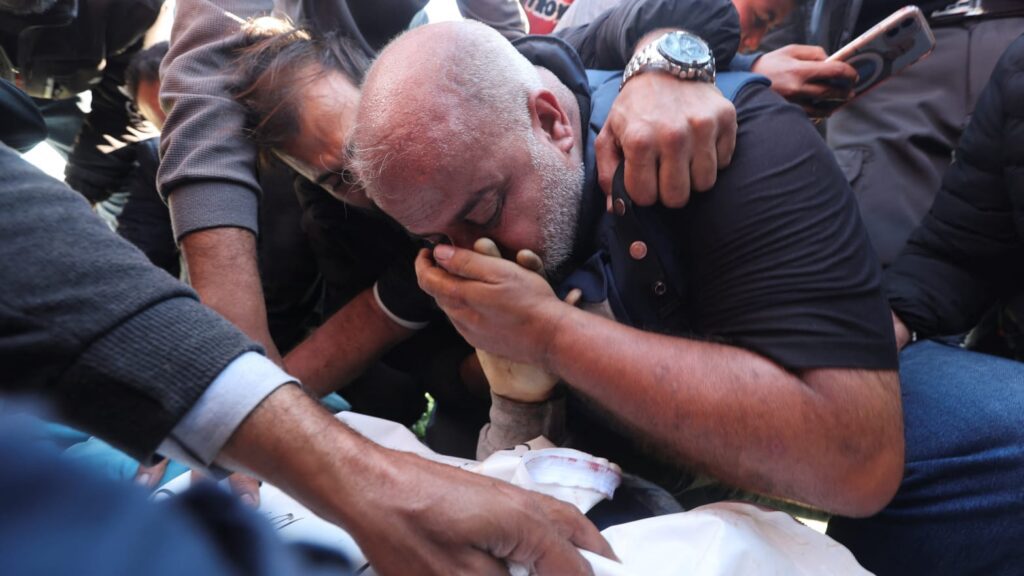On Sunday, February 5, the mother of Al-Jazeera journalist Wael al-Dahdouh, Nadhira, died of illness at a hospital in Gaza according to the Qatari news platform.
Since the onset of the war on Gaza, Al-Dahdouh has been one of the prominent faces reporting on Israel’s aggression across the strip. He suffered immense losses when Israeli airstrikes claimed the lives of his wife, children, grandchildren, nephew and niece amongst other family members.
As of January 18, at least 94 journalists have been killed, most (87) of whom are Palestinians, with Israeli attacks intentionally targeting journalists and civilians. Many others, like al-Dahdouh, have lost family members, friends and colleagues.
Innumerable losses, and a commitment to journalism
Al-Dahdouh, like many of his Gazan fellows, suffered immense and incomparable losses.
Last month, the journalist lost his eldest son Hamza after an Israeli strike targeted and killed him alongside fellow journalist Mustafa Thuraya. Following the footsteps of his father, Hamza was also working for Al-Jazeera at the time.
In late October, al-Dahdouh lost his wife Anna, his son Mahmoud, his daughter Sham and his grandson Adam, in addition to eight of his other relatives due to Israeli air raids during the first month of the escalations on the Nuseirat refugee camp in Gaza. Al-Dahdouh was broadcasting live on air when he learned of the news
Notably, al-Dahdouh quickly returned to reporting after both incidents, resuming reporting on the aggression as early as the very next day.
On December 15, al-Dahdouh was wounded in an Israeli drone strike that killed his close colleague at Al-Jazeera, cameraman Samer Abudaqqa. At the time, Dahdouh was evacuated and treated for shrapnel injuries, but Abu Daqqa, who was seriously wounded, was unreachable as Israeli forces prevented ambulances from reaching him. Abu Daqqa bled to death many hours later.
While Dahdouh continued to report on the ongoing events, he was granted permission to evacuate to Egypt via the Rafah Crossing in January at the request of the Egyptian Journalists’ Syndicate in Cairo, after which he reached Doha via Al-Arish Airport for medical treatment on January 16. Al-Dahdouh has since received treatment for his wounds and injuries.
“The Mountain”: A Symbol of Courage
On Friday, India’s Kerala Media Academy awarded its Media Person of the Year award to al-Dahdouh in recognition of his exceptional journalistic courage, branding him as “a global face of journalistic courage, who continues to work despite the heavy losses borne by his family.”
Al-Dahdouh has been working in the journalistic field for over 25 years. He began his career in 1998, where he worked across several platforms such as Al-Quds, Voice of Palestine, Al-Arabiya.
In 2004, he took up a position for Al-Jazeera, where he received the Peace Through Media Award in 2013.
Earlier in his life, al-Dahdouh had spent seven years in Israeli prisons immediately after obtaining his high school diploma in 1988.
He then received his BA in journalism and media from the Islamic University in Gaza in 1998. After Israeli authorities prevented him from continuing his postgraduate studies abroad, he received a Master’s degree in regional studies from Al-Quds University, Abu Dis, in 2007.
Both universities were targeted in Israeli attacks intentionally aimed at Palestinian educational institutions, resulting in the killing of the Islamic University of Gaza’s president and prominent scientist, Professor Sufyan Tayeh, alongside his family in an Israeli air strike on the Jabalia refugee camp on December 2, 2023.
Most recently, al-Dahdouh has become a hot topic worldwide for what many consider to be incredible resilience and tireless commitment to the field of journalism. For many in the Arab world, al-Dahdouh has become a household name across the years for his reporting in Gaza.
In light of his recent losses, al-Dahdouh acquired the nickname “the mountain”, signifying his strength, steadfastness, and resilience.
As matters stand, the targeting of journalists by Israeli forces has been part of a wider systematic campaign to hide the current state of affairs in Gaza and the region, suppress Palestinian voices, spread disinformation and play a central role in the ongoing genocidal campaign.
